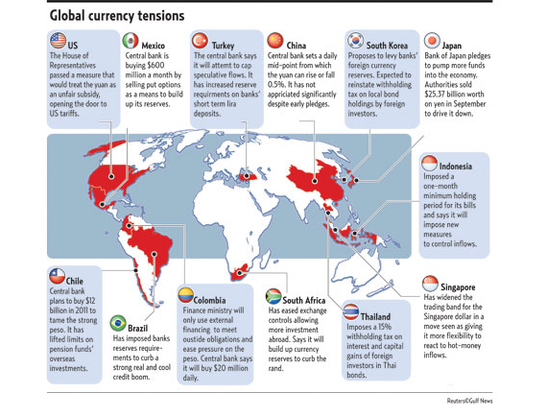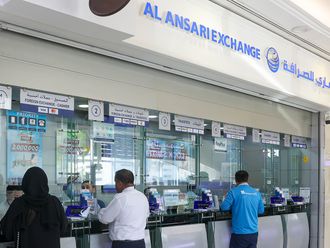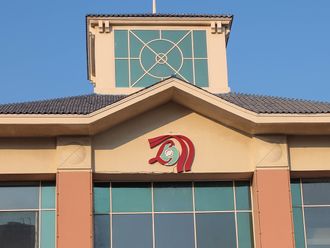
New York: The euro rose against all its major counterparts last week as speculation increased that European policy makers will craft a long-term approach to handle the region's sovereign-debt crisis.
The 17-nation euro advanced the most against the currencies of commodity-exporting countries, such as the South African rand and New Zealand dollar, on concern China will take more measures to cool economic weakened, curbing appetite for raw materials.
Canada's dollar weakened, touching parity with its US counterpart, after the nation's central bank held interest rates unchanged.
The US dollar fell against the euro before a Federal Reserve policy meeting last week.
"There's still a degree of optimism that the leaders will deliver something on the European Financial Stability Facility fund," said Alan Ruskin, global head of Group-of-10 foreign exchange strategy at Deutsche Bank AG in New York.
Futures bets
The euro rose 1.7 per cent to $1.3621, from $1.3388 January 14. It touched $1.3626 Friday, the highest since November 23. The 17-nation currency climbed 1.4 per cent to 112.48 yen, from 110.94 last week. The dollar fell 0.4 per cent to 82.57 yen, from 82.87.
Futures traders reversed their bets the euro will decline against the dollar, calling for a gain in the shared currency for the first time since November, figures from the Washington- based Commodity Futures Trading Commission show.
The difference in the number of wagers by hedge funds and other large speculators on an advance in the euro compared with those on a drop — so-called net longs — was 4,109 on January 18, compared with net shorts of 45,182 a week earlier.
Euro-area finance ministers pledged at a meeting January 17 to strengthen the region's safety net for debt-strapped countries. Speculation has increased that leaders may boost the lending capacity of the European Financial Stability Facility, which is backed by €440 billion in guarantees by euro-area governments, and expand the facility's role to allow for debt purchases.
The Ifo Institute's business climate index, based on a survey of 7,000 German executives, was 110.3 in January, up from the 109.9 median of 41 forecasts in a Bloomberg News survey. That's the highest since records for a reunified Germany began in 1991.
Positive data in Europe "is taken in the context of what to do about peripheral debt issues," said Jack Spitz, managing director of foreign exchange at National Bank of Canada in Toronto.
"The data may be strong in areas of the Eurozone that continue to be seen as the givers rather than the takers. It speaks to the dichotomy."
China's economic growth quickened to an annual rate of 9.8 per cent in the fourth quarter, up from 9.6 per cent in the prior three months, the statistics bureau said in Beijing.
Consumer prices rose 4.6 per cent in December from a year earlier, compared with 5.1 per cent the previous month.
The People's Bank of China will increase the key one-year lending rate to 6.81 per cent from 5.81 per cent this year and let the yuan strengthen about six per cent against the dollar, Nomura Holdings forecast this week.
"The market remains cautious on the outlook for commodity currencies," said Omer Esiner, chief market analyst in Washington at Commonwealth Foreign Exchange, a currency brokerage.
"There's a pretty strong concern around the outlook for China to continue tightening monetary and credit conditions in order to keep a lid on inflation pressures. That raises the risk of a potential hard landing for a key engine of the global recovery."
South Africa's rand, the worst performer against the euro this week, lost 3.6 per cent to 9.6124 per euro, from 9.2821 Jan. 14.
The New Zealand dollar dropped 2.7 per cent to 1.7943 per euro, from 1.7476 last week. Chinese President Hu Jintao met with President Barack Obama and business leaders in a visit to the US this week.
Obama said the yuan "remains undervalued" and urged Hu to continue steps toward a currency "increasingly driven by the market."
The Canadian dollar dropped after reaching the strongest level in more than two years versus the greenback after the Bank of Canada held its target lending rate at one per cent and said future interest-rate increases would be "carefully considered."
Fed may keep rates steady
The loonie, as Canada's currency is also known, weakened 0.2 per cent to 99.31 Canadian cents after touching 98.38 cents January 18, the strongest level since May 2008. It reached C$1.0031 January 20, the weakest level since January 4. The Swiss franc dropped 1.2 per cent to 1.3055 per euro, down from 1.2899 January 14.
Swiss central bank President Philipp Hildebrand said the franc's ascent is curbing exports and hampering the country's economic recovery.
The franc has appreciated 13 per cent against the euro during the past year as investors sought a haven from euro-area fiscal problems.
The Dollar Index, which tracks the greenback against the currencies of six major US trading partners including the euro, yen and pound, fell 1.3 per cent to 78.124, from 79.162 January 14.
Fed Chairman Ben S. Bernanke will keep interest rates unchanged at the central bank's meeting on Tuesday, according to all 92 economists in a Bloomberg survey. The Fed has kept its benchmark at zero to 0.25 per cent since December 2008.











